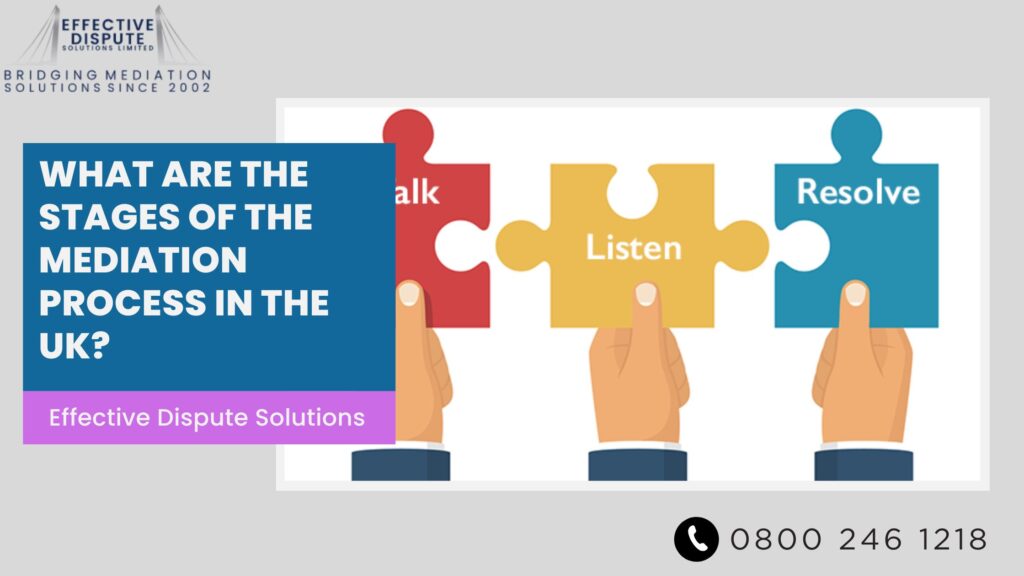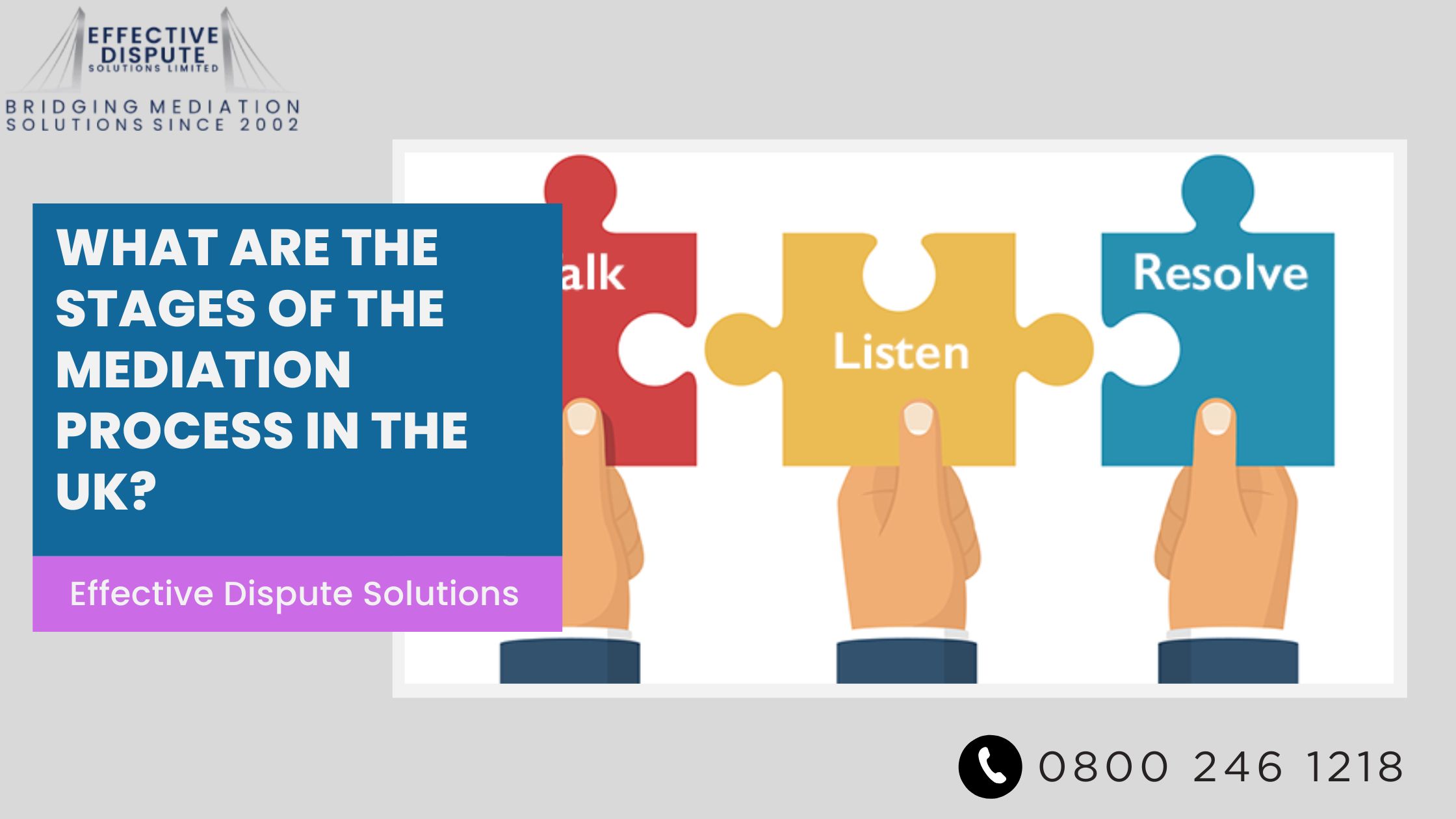
Conflict is a part of life, but sometimes it requires more intense measures to resolve it. Mediation services step in during times like this. Mediation is an approach to resolving conflicts at the individual, business, or group level with the assistance of a neutral third party, known as a mediator. But what steps are taken during mediation? How many stages are in the UK mediation process? This blog will discuss all the stages of mediation in the UK.
What Is the Mediation Process?
The mediation process in the UK is a systematic method to resolve disputes. It is confidential, free from unwanted disruptions, and less rigid than a court. A mediator takes you through every step of the process. The consensus at the conclusion is to reach an agreement that all participants find acceptable.
The mediation process consists of the following stages:
Stage 1: Preparation and Starting the Process
- All the necessary actions for mediation culminate in a final day when all parties will engage. This phase is the pre-mediation stage.
- Each party consents voluntarily to mediation.
- Each side selects an agreeable mediator, and a date and meeting place are set, which can be either physical or virtual.
- Everyone provides some outlines of the issue at hand.
- The mediator will request that specific information, such as contracts, leases, agreements, emails, or pictures, be given to them prior to the mediation.
- In most mediations each party will have submitted a position statement. Which summarises their version of events, what has led to the dispute, and what is required to resolve it.
Why is this part crucial?
Preparation is necessary to set a positive tone for a respectful, open, and judgment-free discussion.
Stage 2: Introduction and Opening Statements
- The mediation process begins with a pre mediation meeting. This allows for introductions, for the parties to speak to the mediator in private, and to sign the agreement to mediate, if it has not already been signed.
- Those in attendance are welcomed by the mediators, in an opening joint meeting. Who provides an overview of their role, and the process.
- Those present must be given the ground rules of mediation, and be reminded that participation is voluntary.
- Each participant gives their name and role, as usually some of the parties have never met.
- The mediator summarises any points made, clarifying and responding to any raised questions.
What comes next?
Up to this moment, each participant had been entirely silent, and now, both sides can air their views concerning the problem at hand. People explain what has happened, the impact it has had on them, and what they intend to do about it / want to achieve.
Stage 3: Joint Discussion
In most cases, a joint discussion follows after the opening statements.
- Everyone is given the opportunity to respond to what they have heard.
- The mediator ensures that everyone addresses the core problem and its associated priorities.
- The aim is to determine what all parties can agree on, while identifying where the real disagreements lie.
Tip:
This is one of those moments when everyone involved should focus on listening and asking questions. Sometimes, simply listening to the other side can resolve part of the issue.
Stage 4: Private Sessions (Caucus)
Now, the mediator sits down with each side individually. These sessions are called private sessions or ‘ a caucus’.
- The mediator meets each party separately and keeps these discussions confidential.
- Participants express their emotions, concerns, and proposed solutions candidly.
- The mediator helps each side understand the strengths and weaknesses of their claim. To include the litigation risk.
- They may help assess the feasibility of some suggestions and recommend other alternatives.
What is the value?
Private sessions enable free conversations. In the absence of the other party, some people are more truthful. Feel more comfortable.
Stage 5: Deals and Solutions
- The mediator will have a series of private and joint meetings with each side as appropriate.
- The mediator communicates proposals and feedback from one side to the other and vice versa. Keeping confidential information to themself. At times if it would aid discussions and only with the permission of both parties, would the mediator divulge anything that is confidential.
- Both sides begin making counteroffers, proposing terms of compromise, and hunting for answers.
- The mediator shifts everyone’s focus away from demand to what can be done.
- This step might take multiple attempts. The goal is to develop a mutually agreeable solution for all the participants.
Step 6: Arriving at a Settlement
- The mediator assists both sides in reaching an understanding and captures the essential components, provided that both parties consent to the process.
- The agreement is easy to understand.
- Everyone goes through the document and gives their consent by signing it.
- Once signed (unless it is a workplace dispute) the document will become a legally enforceable contract.
- What happens in cases where an agreement is not reached?
If an agreement is not reached, the mediator will close the session. After this, the dispute can be taken to court or pursued through another means. Still, even if no agreement is reached, mediation helps some people understand the other’s viewpoints and resolves some of the issues.
Stage 7: Ending the Mediation Process
- Lastly, the mediator expresses gratitude to the participants and thanks them for taking part in the mediation.
- If an agreement is reached, the mediator clarifies the terms with the participants to ensure everyone understands it.
- In the absence of an agreement, the mediator describes the next steps in the process.
- What is said during mediation remains confidential and cannot be presented in court unless both parties agree otherwise.
What Happens During Each Stage of Mediation in the UK?
Here’s a quick summary:
| Stage | What Happens |
| Preparation | Choose mediator, share documents, set date |
| Introduction | Mediator explains process, rules, and goals |
| Opening Statements | Each side tells their version of the dispute |
| Joint Discussion | Both sides discuss issues together |
| Private Sessions (Caucus) | Mediator meets each side alone to explore solutions |
| Negotiation | Offers and ideas are shared, compromises discussed |
| Agreement & Closing | Agreement written and signed, or mediation ends without agreement |
Why Is the Mediation Process Important?
The stages of the mediation process in the UK aim to maintain equality, civility, and balance in the process. With these steps, everyone has the opportunity to share their thoughts, listen to others, and collaborate to resolve issues. Mediation works for all types of conflicts, including relationships, commercial, and work-related disputes.
Conclusion
Knowing the steps of the mediation process makes the experience less anxiety-inducing and more effective. Dealing with family matters, a workplace issue, business conflicts, or boundary disagreements becomes easier when you are prepared and know what lies ahead. Mediation is about collaboration and systematically resolving issues.


